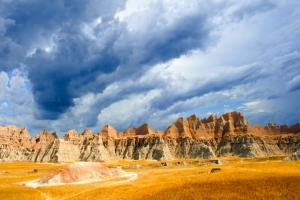
Badlands are dry terrains that occur due to deep erosion of sensitive consolidated rocks which results in steep slopes, lack of vegetation and complicated stream networks. Badlands are a haven for paleontologists and fossil hunters as these lands have plenty of fresh rocks naturally. Structures like canyons, ravines, gullies hoodoos etc. can usually be found in badlands.
Bandlands are formed during periods when conditions were much different than today. In the distant past, they were covered by water and received many layers of sediment. This eventually hardened to become rock. Many badlands areas also experienced a tropical climate in the past. This can also create layers of sediment that later may harden to become rock. Badlands have also been formed artificially by mining operations and by poor agricultural practices that remove topsoil from the land.
One of the most well known badlands areas in the US is Badlands National Park of South Dakota. More badlands regions can be found in Makoshika National Park of Montana and Theodore Roosevelt National Park of western North Dakota.
Dinosaurs have lived in the past where there are now badlands. This is true for Dinosaur Provincial Park in Alberta, Canada and Valle de La Luna in Argentina where the bones of dinosaurs have been found.
Badlands Definition
Badlands are beautifully carved landforms that are barren, battered and eroded by water and shaped with the help of wearing and wind-driven sand and rain.
We want pictures and location of the lanforms around the world and we need your help. Click get started button below.
In Asia, China, India, Nepal, and Bhutan are home to one of the eight wonders of the world and one of the most beautiful mountains in the world, the Himalaya Mountains also called the Himalayas. Boasting as the world’s highest and most famous mountain peak, Mt. Everest. Within the verse of the ‘Kumarsambhava’, Sanskrit […]
Nature have provided us with fascinating landforms and features. The most often adored landforms are volcanoes. Like the perfect cone structure of Mayon Volcano in the Philippines or Mount Fiji in Japan, people look at their beauty and wonder with great appreciation to nature. Volcanoes are mountains with a very disastrous nature. Their only […]
Taal Volcano is the second most active volcano found in the province of Batangas. A complex volcano in the middle of Taal Lake and is often called an island within a lake, that is an island within a lake that is on an island as well as one of the lowest volcano in the […]
Mayon Volcano is one of the active volcanoes in the Philippines. Located in the southern part of Luzon about 473 kilometers (294 miles) from Makati Business District of the Philippines, Mount Mayon is the main landmark of the Province of Albay of Bicol Region. According to local folklore, the volcano was named after Daragang […]
The global temperature and weather is to a large extent a direct result of the sun’s effect to our planet. Together with the atmosphere and the rotation of the earth on its axis. The earth on which weather moves on has its own effect on the weather. The different landforms like mountains, volcanoes, plains, and the […]